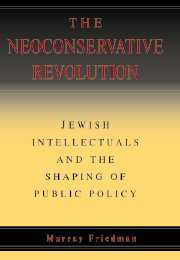Book contents
- Frontmatter
- Contents
- Introduction: American Jews in an Age of Conservatism
- 1 Jews and the Making of the Cosmopolitan Culture
- 2 The Premature Jewish Neoconservatives
- 3 Forgotten Jewish Godfathers
- 4 The Liberal Civil War
- 5 The Modernization of American Conservatism
- 6 The Liberal Meltdown
- 7 The Rise of the Neoconservatives
- 8 Neoconservatives and the Reagan Revolution
- 9 Nicaragua: The Cold War Comes to This Hemisphere
- 10 Irving Kristol and a New Vision of Capitalism
- 11 The Neoconservative Assault on the Counterculture
- 12 Jews and the Christian Right
- 13 Epilogue
- Notes
- Index
3 - Forgotten Jewish Godfathers
Published online by Cambridge University Press: 05 June 2012
- Frontmatter
- Contents
- Introduction: American Jews in an Age of Conservatism
- 1 Jews and the Making of the Cosmopolitan Culture
- 2 The Premature Jewish Neoconservatives
- 3 Forgotten Jewish Godfathers
- 4 The Liberal Civil War
- 5 The Modernization of American Conservatism
- 6 The Liberal Meltdown
- 7 The Rise of the Neoconservatives
- 8 Neoconservatives and the Reagan Revolution
- 9 Nicaragua: The Cold War Comes to This Hemisphere
- 10 Irving Kristol and a New Vision of Capitalism
- 11 The Neoconservative Assault on the Counterculture
- 12 Jews and the Christian Right
- 13 Epilogue
- Notes
- Index
Summary
In The Fifties (1993), David Halberstam describes briefly what he perceived to be a significant political shift in that decade. He writes that although the “traditional left” had been devastated by the “grimness of Communism” and the “success of American capitalism,” there had arisen “a new kind of left” that was alienated from the mainstream in a different way. Instead of attacking capitalism for its failures, Halberstam says, the new left was “essentially criticizing America for its successes, or at least for the downside of its successes.” He names sociologist C. Wright Mills as the key link between “the old left, Communist and Socialist, which had flourished during the Depression, and the New Left which sprang up … to protest the blandness of American life.”
Nowhere in his vast popular study, however, does Halberstam make reference to a growing conservative counterweight to the regnant cosmopolitan culture. His lack of knowledge or indifference reflects the failure of that culture to recognize an important new force that would soon affect the social and political landscape so dramatically. The fifties, in fact, witnessed an extraordinary burst of conservative intellectual energy that foreshadowed the conservative ascendancy of more recent times.
The postwar conservative revival was kicked off in Britain with the publication of The Road to Serfdom (1944), Friedrich von Hayek's broad-gauged attack on collectivism, which became a major event in American intellectual life when it was published in this country.
- Type
- Chapter
- Information
- The Neoconservative RevolutionJewish Intellectuals and the Shaping of Public Policy, pp. 44 - 61Publisher: Cambridge University PressPrint publication year: 2005



